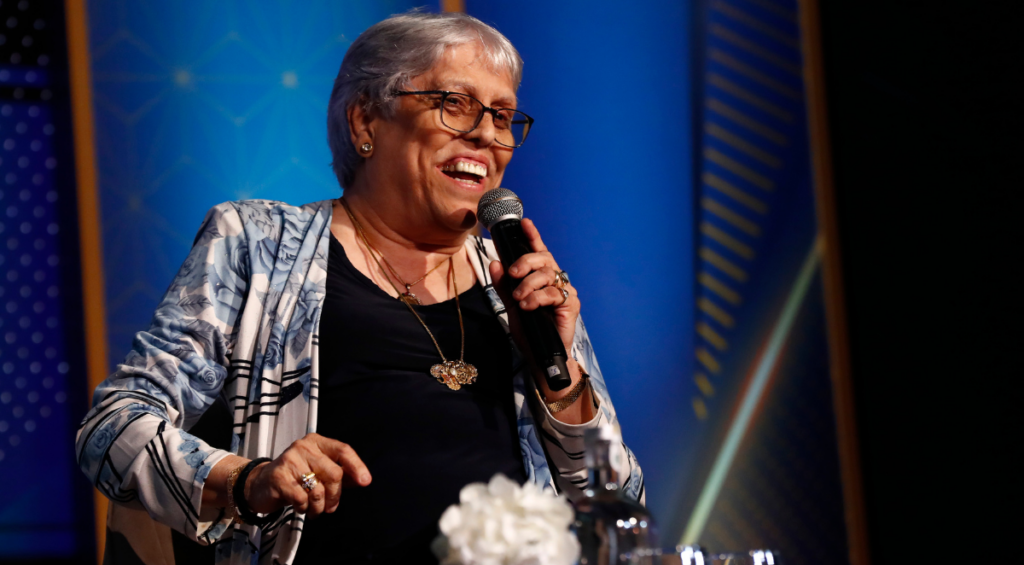
Diana Edulji has become the first Indian woman inducted into the ICC Hall of Fame. Karunya Keshav pays tribute to a pioneer both on and off the field.
When Diana Edulji’s left-arm spin had New Zealand’s Jackie Clark bowled in India’s 1985 women’s Test in Cuttack, she was celebrated as the first woman to reach 100 Test wickets.
She told a reporter later, though, that she had been more thrilled about her 78th wicket that came the previous year against Australia. Because with that, she had edged out Mary Duggan’s record to be the leading female wicket-taker in Test cricket.
“The first record is always better,” she said, without the blush of false humility. “Moreover I had to toil for 16 overs before I got that 78th wicket.”
This was a woman who lived for the thrill of the contest and knew her worth.
There is nothing Dickensian about Edulji’s origin story. The daughter of a Railways officer, she grew up playing tennis-ball cricket with the boys in her perfectly respectable Mumbai neighbourhood, and earned chocolate and praise for working on her leather-ball game at Albees, one of the first few cricket clubs in India for women.
But like that young Victorian boy of fable, who held up his bowl and said, ‘Please, sir, I want some more,’ Edulji was a rebel who challenged the status quo. She knew when she deserved better and she asked for it. She liked to win. She carved her own space and she claimed new ones. She spoke up. She stood firm. She did it with the doggedness of a pugilist, and the conviction of, as a BCCI official later admiringly put it, a trade unionist.
Edulji’s inclusion in the ICC Hall of Fame – the first Indian woman with that recognition – for 2023 is a celebration of her pioneering role in Indian women’s cricket. Her contributions over five decades, as player, administrator and mentor, have ensured the sport is always reaching for more and for better.
In the winter of 1976, for instance, she handed the Railways Minister, who was in attendance at a Test, an application for a job. She was accepted and became the first female cricketer to be employed by the Railways.
Eight years later, she helped push the door open for more women to be employed. Today, the Railways is the largest employer of female cricketers in the country. The team, a domestic powerhouse, attracts the best players and offers them the rare cushion of financial security while pursuing their passion for cricket.
In 1978, leading India in their first World Cup, her team refused to take the field in the game against Australia until the authorities cleared their dues. In the years to follow, as secretary of the ‘Association of Indian Women Cricketers’, which she wrote was “formed by the players themselves to protect and promote the game they love so much”, she was at the forefront of such confrontations with the establishment.
She paid for her outspokenness with the captaincy – which she greeted with more outspokenness. “Had it not been for a press release I read the day before the match, I might have gone out for the toss at Chepauk, and caused everyone a great deal of embarrassment,” she wrote in her match report of the 1981 series against Young England for Sportsworld.
“Women’s cricket gets a raw deal from everyone,” she declared once, accusing the officials of a lack of accountability. When, three decades later, she had her chance as administrator, she ensured amends were made. Former female cricketers were given one-time payments (a demand that had been pending for half a decade), pensions for women were improved and the women’s team enjoyed better conditions for travel and stay.
Yet, even in administration, Edulji didn’t quite shrug off her taste for a skirmish. Her tenure as member of the Committee of Administrators appointed by the Supreme Court of India to clean up cricket was a tumultuous one.
When Rahul Johri, the then BCCI CEO, was cleared of accusations of sexual harassment, she was steadfast in her stance that he was unfit for the job. When members of the men’s team were caught in controversy over sexist and racist statements made on a TV show, she insisted on suspensions. On these, and several other issues, she butted heads with her fellow CoA members and BCCI officials.
Newspaper reports, citing “sources”, called her “difficult” and spoke of colleagues “tearing their hair” over her demands. Any vocal woman who claims a seat at the table in a room full of men will be all too familiar with such language. Edulji’s call to be paid for her time was painted as her being driven by money (although perhaps in her forthrightness she showed more integrity than the hypocritical power grab that marks so many ‘volunteer’ sports official positions). An unbiased evaluation of her legacy as an administrator is muddled by such sexist attitudes.
All these years later, her legacy as a player also comes with an asterisk. Those 100 Test wickets she once celebrated? They are now diminished.
The Hall of Fame honours her 109 wickets across a combined 54 Tests and ODIs. Because of the vagaries of how women’s records are considered, her official figures no longer reflect her feats in games that were seen as ‘international Tests’ at the time they were played, but now don’t have that status. For instance, her stats don’t include her 33 wickets from India’s first two international series or that series against Young England.
In the first match against the Australians in Pune, played then as India’s first ever Test match, Edulji had led the bowling with 6 for 40 in the first innings, before top-scoring with 48. In the second match, when Australia needed 121 to win in Delhi, Edulji and Shantha Rangaswamy bowled all but seven overs to take India to within one wicket of what would have been a significant win. Less than a year later, against the visiting New Zealand team, she picked up her first 10-wicket haul.
Feats such as those gave Indian cricket the foundation upon which to grow, and generations of players the standard to aspire to. Speak to ‘Diana’s girls’ in the circuit, those scores of cricketers spotted and mentored, nurtured by both carrot and stick, and Edulji’s legacy is clear. Her strident voice only supplements the admiration for her as a pioneer and an all-time great. Five decades on, that voice still rings strong.
The post ICC Hall of Fame inductee Diana Edulji is an Indian cricket pioneer who strove for better appeared first on Wisden.
from Wisden https://ift.tt/SvN9CyZ



0 Comments